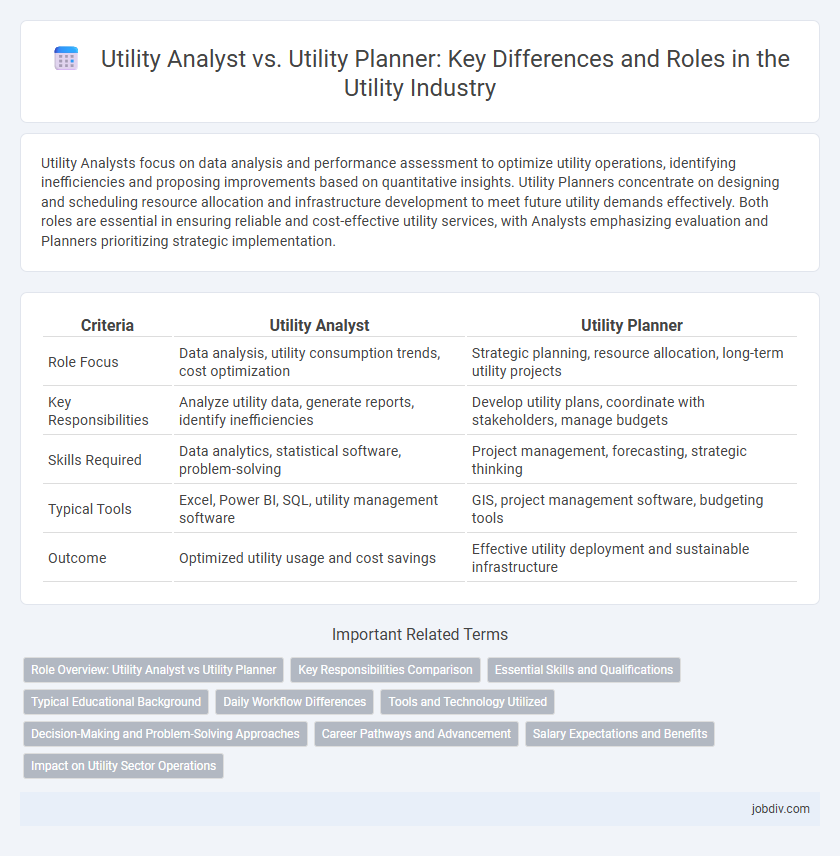Utility Analysts focus on data analysis and performance assessment to optimize utility operations, identifying inefficiencies and proposing improvements based on quantitative insights. Utility Planners concentrate on designing and scheduling resource allocation and infrastructure development to meet future utility demands effectively. Both roles are essential in ensuring reliable and cost-effective utility services, with Analysts emphasizing evaluation and Planners prioritizing strategic implementation.
Table of Comparison
| Criteria | Utility Analyst | Utility Planner |
|---|---|---|
| Role Focus | Data analysis, utility consumption trends, cost optimization | Strategic planning, resource allocation, long-term utility projects |
| Key Responsibilities | Analyze utility data, generate reports, identify inefficiencies | Develop utility plans, coordinate with stakeholders, manage budgets |
| Skills Required | Data analytics, statistical software, problem-solving | Project management, forecasting, strategic thinking |
| Typical Tools | Excel, Power BI, SQL, utility management software | GIS, project management software, budgeting tools |
| Outcome | Optimized utility usage and cost savings | Effective utility deployment and sustainable infrastructure |
Role Overview: Utility Analyst vs Utility Planner
Utility Analysts focus on evaluating data related to energy consumption, operational efficiency, and cost trends to support decision-making and optimize resource allocation. Utility Planners develop strategic plans for future utility infrastructure and capacity expansion, forecasting demand and integrating renewable energy sources to ensure reliable service. Both roles are critical in enhancing utility management, with Analysts emphasizing data analysis and reporting, while Planners concentrate on long-term system planning and development.
Key Responsibilities Comparison
Utility Analysts specialize in data collection, financial modeling, and performance analysis to optimize utility operations and support decision-making processes. Utility Planners focus on developing long-term infrastructure plans, forecasting demand, and coordinating projects to ensure reliable and cost-effective utility service delivery. Both roles require collaboration with stakeholders but differ in strategic versus analytical emphasis within utility management.
Essential Skills and Qualifications
Utility Analysts require strong analytical skills, proficiency in data modeling, and expertise in software tools like SQL and Excel to interpret utility consumption patterns and optimize resource allocation. Utility Planners need advanced project management abilities, knowledge of regulatory compliance, and experience with forecasting methodologies to develop long-term utility infrastructure strategies. Both roles demand a solid understanding of energy markets, regulatory frameworks, and technical aspects of utility operations to support organizational efficiency and sustainability goals.
Typical Educational Background
Utility Analysts typically hold degrees in finance, economics, or business administration, emphasizing data analysis and financial modeling relevant to utility markets. Utility Planners often possess educational backgrounds in engineering, urban planning, or environmental science, focusing on infrastructure development and regulatory compliance within utility sectors. Both roles benefit from specialized certifications related to energy systems and utility management.
Daily Workflow Differences
Utility Analysts concentrate on data collection, cost analysis, and identifying efficiency improvements by examining utility usage patterns. Utility Planners focus on forecasting energy demand, developing resource plans, and coordinating infrastructure projects to meet future consumption needs. The daily workflow of Analysts is data-driven and reactive, while Planners engage in strategic, long-term decision-making and project management.
Tools and Technology Utilized
Utility Analysts primarily use data analytics software, geographic information systems (GIS), and customer information systems to analyze utility consumption patterns and optimize resource allocation. Utility Planners employ advanced modeling tools, project management software, and energy forecasting technologies to design long-term infrastructure projects and ensure reliable service delivery. Both roles integrate smart grid technology and real-time monitoring systems to enhance operational efficiency and decision-making.
Decision-Making and Problem-Solving Approaches
Utility Analysts prioritize data-driven decision-making by analyzing consumption patterns, forecasting demand, and identifying inefficiencies to optimize resource allocation. Utility Planners emphasize strategic problem-solving by developing long-term infrastructure plans and coordinating with stakeholders to ensure reliable service delivery. Both roles leverage analytical tools, but Analysts focus on current operational improvements while Planners address future utility system challenges.
Career Pathways and Advancement
Utility Analysts specialize in data analysis and performance metrics to optimize utility operations, paving the way for advancement into senior analytical roles or strategic management positions. Utility Planners focus on project coordination and resource allocation, typically progressing into roles such as project managers or utility operations directors. Both career pathways offer advancement opportunities through acquiring specialized certifications and leadership experience within the utility sector.
Salary Expectations and Benefits
Utility Analysts typically earn an average salary ranging from $65,000 to $85,000 annually, focusing on data analysis and efficiency improvements, which can lead to performance bonuses and professional development benefits. Utility Planners command higher salaries, often between $75,000 and $100,000, due to their strategic role in project planning and resource allocation, with benefits including health insurance, retirement plans, and potential for overtime pay. Both positions offer opportunities for career advancement and industry-specific certifications, enhancing long-term earning potential and job security.
Impact on Utility Sector Operations
Utility Analysts optimize data-driven decision-making by analyzing consumption patterns and forecasting demand, enhancing operational efficiency in the utility sector. Utility Planners focus on long-term infrastructure development and resource allocation, ensuring reliability and capacity to meet future needs. Together, their roles drive cost-effective service delivery and strategic investment in utility operations.
Utility Analyst vs Utility Planner Infographic

 jobdiv.com
jobdiv.com